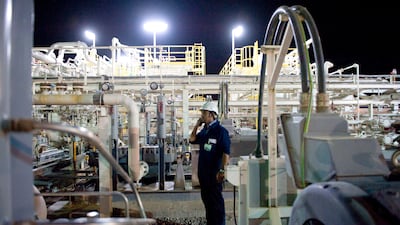Oil producers operating in Iraq's semi-autonomous Kurdish region have denied reports that a deal was made to resume oil exports through the crucial Iraqi-Turkey pipeline, which was closed about a year ago.
The Association of the Petroleum Industry of Kurdistan (Apikur) said on Saturday that no agreement has been reached by the government of Iraq, the Kurdistan Regional Government and international oil companies to restart oil exports through the pipeline.
Member companies “would welcome the reopening of ITP”, it said.
“Regrettably, to date, we have not even seen any proposals” from the Iraqi government or the Kurdistan Regional Government for the agreements that would be required to do so, it added.
The association's members include international oil and gas companies with a direct or indirect interest in upstream oil or gas contracts in Iraq's Kurdistan region. Many of the companies have had to stop output because of the pipeline's closure.
Apikur's denial comes after Iraq's Foreign Minister Fuad Hussein told Bloomberg on Saturday that talks are under way between oil companies, the Iraqi government in Baghdad and the Kurdistan Regional Government to resume crude oil exports via Turkey.
Iraq may amend its federal budget to pay recovery and transit fees to international oil companies in a bid to restart the crucial oil pipeline after a year, he said.
The Iraq-Turkey pipeline's closure since March 2023 has cut off about half a million barrels of crude per day from global markets, according to Bloomberg.
Turkey halted the flows through the pipeline of 450,000 barrels per day of oil after an arbitration court ruled that Ankara had breached a 1973 agreement by allowing Kurds to pump oil without Iraqi consent.
The court ordered Turkey to pay Iraq damages of about $1.5 billion for unauthorised exports by the Kurdistan Regional Government between 2014 and 2018.
No oil from the Kurdistan region has since been exported.
The stoppage has had serious consequences, including job cuts, as oil producers have been forced to reduce output, while the regional government has been unable to dispense full salaries and social service payments.
The oil sector accounts for about 80 per cent of income for the Kurdish region, Apikur estimates.
Iraq is reportedly losing $1 billion for each month that the pipeline remains closed, it said on Saturday.
Apikur said meetings were held in Baghdad from January 7 to January 9 between all the stakeholders to discuss the resumption of exports through the pipeline.
“But thus far, there has been no concrete progress towards that end presented to the members of Apikur,” it said.
Apikur member companies are ready to meet again with government officials to “swiftly resolve the issues to the benefit of all”.
In February, Apikur also called on US Congressional officials to encourage Iraqi Prime Minister Mohammed Shia Al Sudani to reopen the crucial pipeline.
“Urgent White House and US Congressional action is needed to ensure economic stability in the Kurdistan region and protect significant US investments,” it said on February 16.


